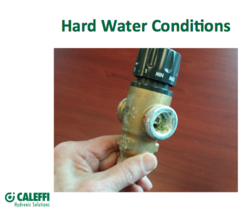Hot water from the boiler coil is hot enough to cause a burn. I think it has been like this from day one of the boiler install but I could never get the installer back to correct the problem. A plumber looked at the situation and said the valve is not in the right place. Does it make a difference where the valve is installed? The coil is at the very top/rear of the boiler and the mixing valve is at the same height and apprx. 1 foot from the coil inlet/outlet.
Had another person say he thinks it's just a defective mixing valve and possibly when it was soldered in a piece of solder got into the vale itself and that's why it has been defective?
Had another person say he thinks it's just a defective mixing valve and possibly when it was soldered in a piece of solder got into the vale itself and that's why it has been defective?


